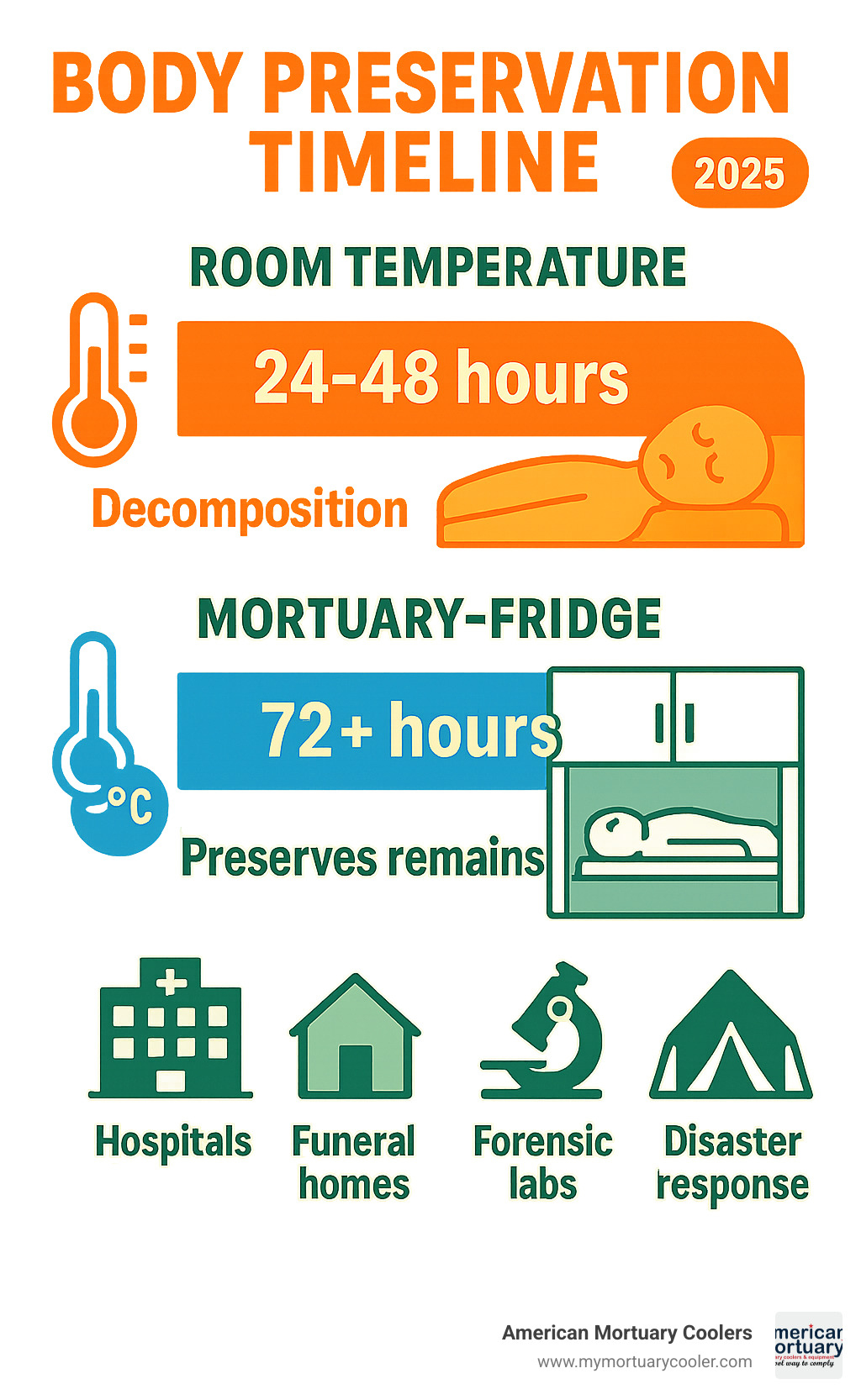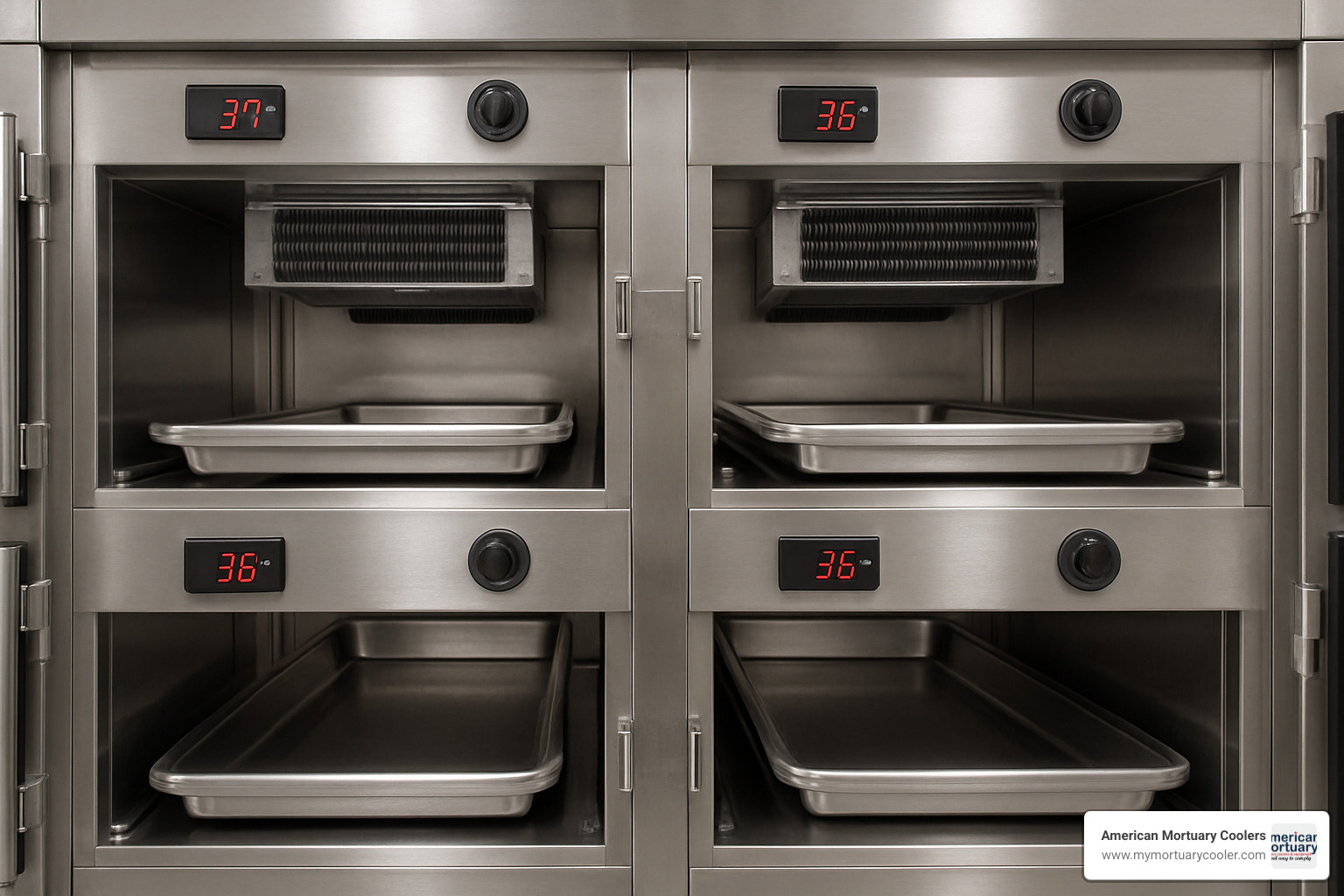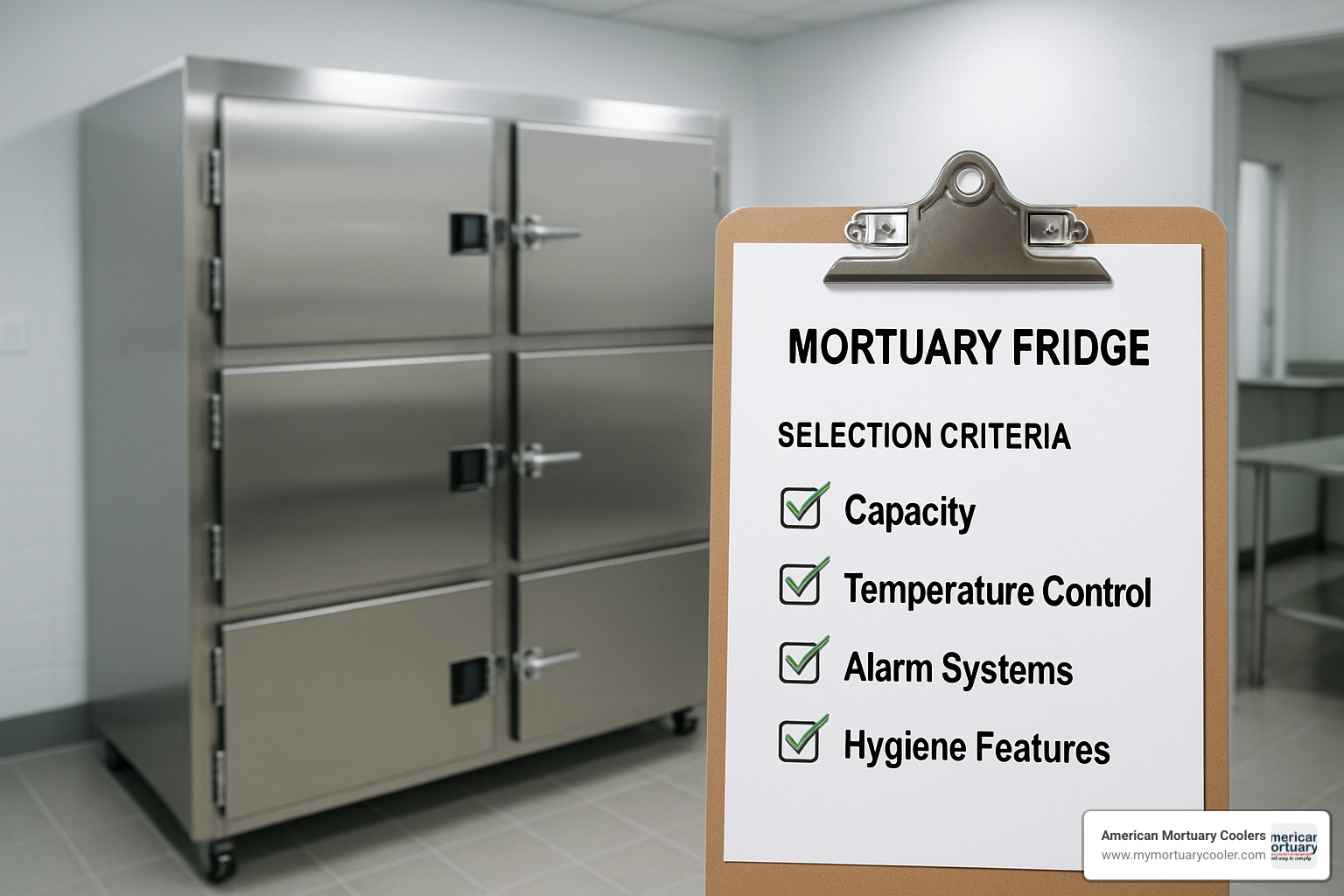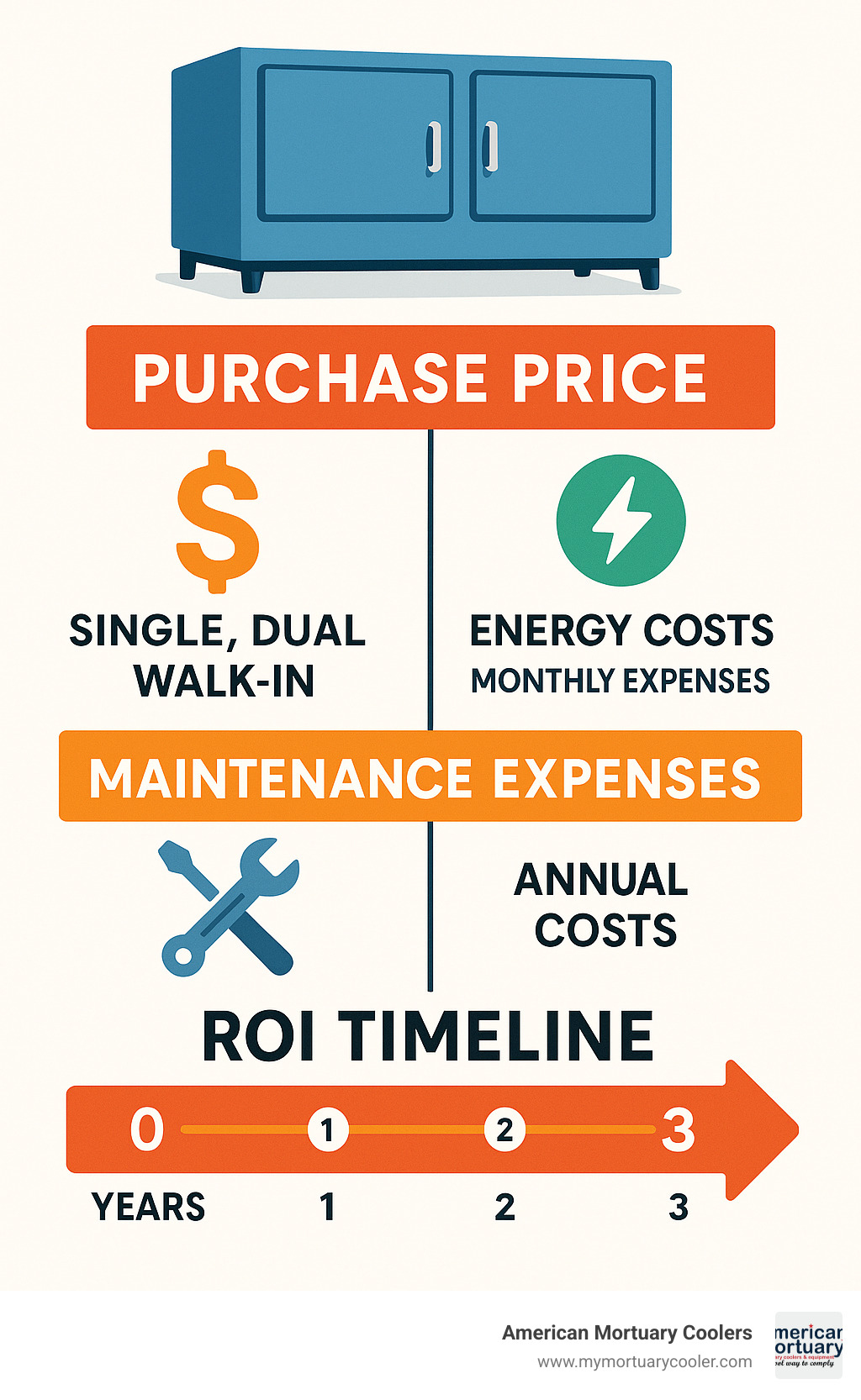Why Mortuary Refrigeration Is Critical for Modern Facilities
A mortuary-fridge is a specialized refrigeration unit that preserves human remains at controlled temperatures between 2°C and 8°C, preventing decomposition while maintaining dignity during storage. These essential systems serve hospitals, funeral homes, forensic laboratories, and disaster response teams.
Key mortuary-fridge specifications:
- Temperature range: 2°C to 8°C (36°F to 46°F)
- Storage duration: Up to 72 hours or longer
- Capacity options: Single body to 50+ body walk-in units
- Construction: Stainless steel interior with high-density insulation
- Price range: $3,000 to $100,000+ depending on size and features
The need for reliable body preservation has never been more important. Whether you're dealing with family arrangement delays, legal investigations, or simply providing respectful temporary storage, a quality mortuary-fridge solves critical hygiene and safety challenges that every facility faces.
Modern mortuary refrigeration goes far beyond basic cooling. These units feature digital temperature controls, audio-visual alarms, antimicrobial surfaces, and modular designs that can be customized for your exact space requirements. The difference between a standard commercial refrigerator and a proper mortuary-fridge lies in specialized components like vapor-proof lighting, seamless interior corners, and individual chamber controls.
Time and temperature control are absolutely critical in medical and forensic preservation. Without proper refrigeration, decomposition accelerates rapidly - especially in warmer climates where ambient temperatures can reach dangerous levels.
I'm Mortuary Cooler, a national-level mortuary cooler supplier with extensive experience helping facilities across the US select and install the right mortuary-fridge solutions for their specific needs. My background in mortuary equipment has shown me that choosing the wrong system can lead to costly operational headaches and compromised service quality.

Mortuary-fridge terms made easy:
What Is a Mortuary Fridge?
When someone passes away, time becomes critical. A mortuary-fridge is your essential partner in preserving human remains with dignity and respect during those crucial hours or days when immediate burial or cremation isn't possible.
Think of it as a specialized guardian that maintains the perfect environment for respectful care. Unlike your everyday commercial refrigerator, a mortuary-fridge is engineered specifically for the unique challenges of human preservation, maintaining precise temperatures between 2°C and 8°C to slow decomposition while honoring the dignity every person deserves.
The primary purpose goes far beyond simple cooling. These units serve as temporary sanctuaries when families need time to make arrangements, when legal requirements demand investigation, or when cultural traditions require extended viewing periods. Your mortuary-fridge becomes a bridge between loss and final rest, ensuring that every person receives respectful care during this transition.
Mortuary-fridge Essentials
Every quality mortuary-fridge is built around four fundamental principles that separate it from ordinary refrigeration equipment.
Temperature precision is everything. The sweet spot for preservation falls between 2°C to 4°C, though most units can reliably maintain anywhere from 2°C to 8°C with remarkable ±1°C accuracy. This range effectively slows bacterial growth and decomposition without causing tissue damage from freezing.
Construction quality makes all the difference in daily operation. The interior chamber uses stainless steel grade 304 for its superior corrosion resistance and easy cleaning properties. Surrounding this is high-density polyurethane foam (PUF) insulation, typically 60-80mm thick, which provides exceptional thermal retention while acting as a vapor barrier.
Flexible capacity means you can choose what works for your space and needs. Options range from single-body chambers perfect for smaller facilities to multi-body configurations that can accommodate 2, 3, 4, or 6 bodies. Each chamber operates independently with its own temperature controls and refrigeration system.
Hygiene design ensures safe, sanitary operation. Features like seamless interior corners, antimicrobial surface treatments, and vapor-proof lighting systems make cleaning straightforward while preventing contamination risks.
Who Needs a Mortuary-fridge?
The need for reliable mortuary refrigeration touches more industries than you might expect, each with unique requirements and challenges.
Hospitals face unpredictable timing when patients pass away. Whether pending family arrangements or awaiting autopsy requirements, hospitals need dependable preservation to maintain dignity while preventing health hazards. A mortuary-fridge provides that crucial buffer time.
Funeral homes understand that grief doesn't follow schedules. When immediate services aren't possible or when accommodating cultural and religious practices requiring extended viewing periods, proper refrigeration becomes essential for respectful care.
Forensic laboratories and police departments require specialized storage during legal investigations, evidence collection, and postmortem examinations. The controlled environment of a mortuary-fridge helps preserve crucial evidence while maintaining chain of custody requirements.
Disaster response teams deploy portable units during mass casualty events when normal infrastructure becomes overwhelmed. Having reliable refrigeration can mean the difference between chaos and organized, dignified response.
NGOs and elder care facilities increasingly recognize the value of having mortuary refrigeration on-site to handle unexpected deaths with appropriate dignity and safety protocols, rather than relying on external services that may not be immediately available.
Inner Workings, Types & Key Features

Understanding how your mortuary-fridge actually works takes the mystery out of choosing the right unit. Think of it as a highly specialized refrigerator that's been engineered specifically for mortuary applications - because that's exactly what it is.
The heart of every mortuary-fridge is a standard refrigeration cycle, but with components built to handle the unique demands of body preservation. The system circulates refrigerant through a finned-tube evaporator, typically using eco-friendly R-134a refrigerant that's both effective and environmentally responsible. ISI-marked compressors provide the reliable operation you need when failure isn't an option.
What makes these units special is their forced-air circulation system with coaxial blowers. This isn't just fancy engineering - it ensures uniform temperature distribution throughout every corner of the chamber. No hot spots, no cold zones, just consistent preservation.
Modern units come equipped with microprocessor-based PID digital temperature controllers featuring clear LED displays. You'll see real-time temperatures at a glance, and the system maintains precision that would make a Swiss watchmaker proud. Audio-visual alarms immediately alert your staff to temperature deviations, power failures, or if someone accidentally leaves a door open.
For facilities requiring detailed compliance records, optional data loggers automatically record temperature history. This documentation proves invaluable for quality assurance and regulatory requirements.
For comprehensive technical guidance on corpse refrigeration applications, including insulation requirements and ventilation standards, this Scientific research on corpse refrigeration resource provides detailed engineering specifications.
Mortuary-fridge vs Mortuary Freezer
Here's where many people get confused - and it's an important distinction that affects both your budget and your operations. The choice between positive and negative temperature storage depends entirely on your specific needs.
Positive temperature units operating at 2°C to 4°C are your workhorses for most applications. They slow decomposition significantly without stopping it completely, which preserves tissue integrity for viewing and examination. These units handle standard short-term storage of 72 hours or less with lower energy consumption, making them perfect for most funeral homes and hospitals.
Negative temperature units running at -10°C to -50°C completely halt decomposition by freezing tissue. You'll find these primarily in forensic institutes where evidence preservation requires extended storage periods of weeks or months. They consume more energy and require specialized handling, but they're absolutely necessary for legal cases requiring long-term preservation.
| Feature | Positive Temp (2-4°C) | Negative Temp (-10 to -50°C) |
|---|---|---|
| Primary Use | Short-term preservation | Long-term/forensic storage |
| Decomposition | Slowed significantly | Completely halted |
| Tissue Quality | Maintains natural appearance | Frozen, requires thawing |
| Energy Cost | Lower | Higher |
| Typical Duration | 72 hours | Weeks to months |
Capacity & Configurations
mortuary-fridge units aren't one-size-fits-all solutions, and that's actually good news for your facility planning. Cabinet-style units come in configurations for 1, 2, 3, 4, and 6 bodies, offering the flexibility to match your typical volume needs. Each chamber operates independently, so you're not cooling empty space unnecessarily.
For larger operations, walk-in systems accommodate anywhere from 10 to 50+ bodies. These use modular, prefabricated panels that make installation straightforward and allow for future expansion when your needs grow.
Bariatric storage units deserve special mention because they address a real-world need that standard units simply can't handle. With reinforced construction and wider chambers, these units safely accommodate weights up to 450+ pounds, ensuring dignified care regardless of body size.
The beauty of modular designs lies in their adaptability. Prefabricated metal-clad insulated panels enable quick installation and future relocation if your facility layout changes. This flexibility proves invaluable as operational needs evolve over time.
Essential Components
Every quality mortuary-fridge incorporates components that work together seamlessly. Digital temperature controllers use microprocessor-based systems to maintain precise temperatures with 0.1°C display accuracy and programmable set points that you can customize for specific requirements.
Alarm systems provide your first line of defense against equipment failure. Audio-visual alerts immediately notify staff of high or low temperatures, power failures, and door-ajar conditions, ensuring problems get addressed before they become disasters.
Data logging capabilities might seem like an optional feature, but they're increasingly important for regulatory compliance and quality assurance documentation. These systems continuously record temperature data, providing the paper trail that inspectors and families expect.
Vapor-proof lighting represents one of those details that separates mortuary equipment from standard refrigeration. Interior LED fixtures resist moisture while providing clear visibility during body handling - a seemingly small feature that makes daily operations much safer and more professional.
Rack systems including telescoping slide rails, cantilever racks, and removable trays facilitate safe body handling while maximizing storage efficiency. Good rack systems reduce physical strain on staff and minimize the risk of accidents during transfers.
Materials & Hygiene Design
The construction materials and design features of your mortuary-fridge directly impact daily operations, maintenance requirements, and long-term durability. Stainless steel grade 304 interior surfaces provide superior corrosion resistance while enabling thorough disinfection with standard cleaning products. The No. 4 finish offers the right balance of cleanability and durability for mortuary applications.
Galvanized steel exteriors resist corrosion while providing structural strength at a reasonable cost. For premium applications where appearance matters, some manufacturers offer stainless steel exteriors that maintain their professional look for years.
Antimicrobial finishes like SmartProtec® represent advanced surface treatments that actively prevent harmful bacteria growth. These treatments reduce cleaning requirements while providing an extra layer of protection against contamination.
Seamless design elements including rounded interior corners, continuous welds, and overlap doors with magnetic gaskets eliminate the crevices where contaminants typically accumulate. This attention to detail makes thorough cleaning possible and reduces the risk of cross-contamination between uses.
Buying, Owning & Maintaining Your Unit

Buying your first mortuary-fridge can feel overwhelming, but it doesn't have to be. I've walked hundreds of facilities through this process, from small funeral homes in rural Tennessee to major hospital systems in Los Angeles. The key is knowing what questions to ask before you start shopping.
Start with your space requirements. Measure your available area carefully - not just the footprint, but also door clearances and ceiling height. Don't forget about ventilation needs either. Most units need at least 6 inches of clearance around the condenser for proper airflow.
Power requirements vary significantly. Single-body units typically run on standard 110V outlets, while larger systems need 220V service. If you're planning a walk-in cooler, you might need an electrician to upgrade your electrical panel.
Capacity planning trips up many buyers. Calculate your peak storage needs, not your average. That quiet week in January doesn't matter when you're facing a busy holiday period or unexpected surge. Always plan for at least 25% more capacity than you think you need.
Budget considerations go beyond the sticker price. A basic single-body mortuary-fridge starts around $5,000, while custom walk-in systems can reach $100,000 or more. Remember to factor in delivery costs, installation, and any electrical work needed.
Warranty coverage varies dramatically between manufacturers. Look for comprehensive protection covering panels (10-15 years), refrigeration components (5 years), and parts plus labor (minimum 2 years). Cheap units with weak warranties often cost more in the long run.
Don't overlook regulatory compliance. Your local health department may have specific requirements for mortuary refrigeration. Some states require temperature monitoring systems or backup power. Check these requirements before you buy, not after delivery.
For detailed information about available options and configurations, visit our comprehensive guide: More info about morgue fridge options.
How a Mortuary-fridge Preserves Dignity and Safety
A quality mortuary-fridge does much more than keep bodies cold. It protects the dignity of the deceased while ensuring safety for everyone in your facility.
Proper preservation maintains the natural appearance of remains, which is crucial for family viewings. Nothing is more important than giving families the chance to say goodbye with dignity. Temperature control prevents the rapid deterioration that would make viewing distressing or impossible.
Cultural and religious needs often require extended preparation time. Some families need several days to arrange services, while others follow traditions requiring specific timing. Your mortuary refrigeration system accommodates these diverse needs without compromising preservation quality.
Identification integrity becomes critical in forensic situations or mass casualty events. Proper refrigeration prevents deterioration that could complicate identification processes, supporting both legal requirements and family closure.
Infection control protects your staff and visitors. Sealed chambers prevent odors and potential health hazards while maintaining the respectful environment families deserve during difficult times.
Cost Breakdown & ROI
Understanding the true cost of ownership helps justify your mortuary-fridge investment to administrators and partners.
Purchase prices vary widely based on size and features. Single-body units start around $5,000 for basic models, while multi-body systems range from $15,000 to $40,000. Custom walk-in coolers can exceed $100,000 depending on capacity and specifications.
Energy consumption with modern units is surprisingly reasonable. High-efficiency compressors and superior insulation keep operating costs between $50-200 monthly for most installations. Larger walk-in systems consume more power but serve many more bodies per dollar.
Maintenance expenses should be budgeted annually. Professional service contracts typically cost $500-2,000 per year depending on system complexity. Factor in replacement parts, cleaning supplies, and periodic deep sanitization.
Optional features like data loggers ($500-1,500), advanced alarm systems ($300-800), and custom modifications add to initial costs but provide operational benefits that often pay for themselves.
Most facilities report return on investment within 2-3 years through improved operational efficiency, reduced liability risks, and improved service quality. The peace of mind alone often justifies the expense.

Maintenance & Sanitation
Keeping your mortuary-fridge clean and well-maintained isn't just about equipment longevity - it's about maintaining the dignity and safety standards your families deserve.
Daily cleaning takes just a few minutes but makes a huge difference. Wipe interior surfaces with approved disinfectants, check temperature displays, and ensure doors seal properly. This simple routine prevents most problems before they start.
Weekly deep cleaning involves thoroughly disinfecting all surfaces, cleaning door gaskets, and inspecting for wear or damage. Pay special attention to corners and seams where contaminants might accumulate.
Monthly inspections help catch problems early. Check compressor operation, inspect electrical connections, and verify alarm system functionality. Listen for unusual noises or vibrations that might indicate developing issues.
Annual professional service is non-negotiable. Qualified technicians should inspect refrigeration systems, calibrate temperature controls, and replace worn components. This investment prevents costly breakdowns and extends equipment life.
Documentation protects you legally and helps with warranty claims. Maintain cleaning logs, temperature records, and service history. Many facilities use simple logbooks, while others prefer digital tracking systems.
Future Tech & Innovations
The mortuary-fridge industry is embracing new technologies that make these systems smarter, more efficient, and easier to manage.
Remote monitoring systems connect your equipment to the internet, enabling 24/7 temperature tracking with smartphone alerts. You'll know immediately if something goes wrong, even when you're not at the facility. Cloud-based data logging simplifies compliance reporting too.
Eco-friendly refrigerants like R290 (propane) and CO₂ are replacing traditional options with lower environmental impact. These systems often run more efficiently while reducing your facility's carbon footprint.
Modular expansion capabilities let you grow your capacity as needs change. Improved panel systems make it easier to relocate or reconfigure equipment when you renovate or move facilities.
Solar backup systems provide emergency power during outages, which is critical for maintaining preservation integrity. Some facilities are even running their entire mortuary refrigeration systems on renewable energy during normal operations.
These innovations aren't just gadgets - they're practical solutions that help you serve families better while reducing operational headaches and costs.
Frequently Asked Questions about Mortuary-fridge
How long can a body stay refrigerated safely?
When you're dealing with the loss of a loved one, timing questions become incredibly important. A properly functioning mortuary-fridge can safely preserve bodies for 72 hours or longer when maintained at the optimal 2°C to 4°C range.
The actual preservation time depends on several real-world factors that we see across our installations. Temperature consistency matters most - units that maintain steady temperatures between 2-4°C provide the best preservation results. The body's condition before storage also plays a role, as pre-existing health conditions and cause of death can affect how long preservation remains effective.
Environmental factors like humidity levels and how frequently staff open the chamber doors impact preservation quality too. We always recommend following proper facility protocols - good handling practices and strict hygiene standards can extend safe storage duration significantly.
Most funeral homes and hospitals plan for 72-hour maximum storage as their standard operating procedure. Some facilities successfully extend this to one week under optimal conditions, but for longer preservation needs, you'll need to consider embalming or freezer storage options.
What regulations govern mortuary refrigeration?
Navigating the regulatory landscape for mortuary-fridge equipment can feel overwhelming, but understanding the basics helps ensure compliance and peace of mind.
Health department standards form the foundation of most regulations. These typically require specific temperature ranges (usually 2-8°C), regular monitoring schedules, and detailed documentation of storage conditions. Every state has slightly different requirements, but the core principles remain consistent.
OSHA workplace safety standards mandate proper ventilation systems, clear emergency procedures, and comprehensive staff training for anyone operating mortuary equipment. These rules protect your team while ensuring professional operation.
Many local ordinances add their own requirements. Cities with populations over 5,000 often require refrigeration chambers that maintain temperatures between -2°C to 4°C for cemetery and funeral home operations. Your local building department can provide specific requirements for your area.
Building codes cover the installation side - electrical connections, plumbing requirements where drainage is needed, and structural considerations for heavier walk-in units. Professional installation ensures all these bases are covered.
Industry associations provide best practice guidelines that go beyond legal requirements. Following these recommendations demonstrates your commitment to excellence and can help with insurance and accreditation requirements.
Can I customize capacity or temperature settings?
Absolutely! One of the biggest advantages of working with American Mortuary Coolers is our ability to create mortuary-fridge solutions that fit your exact needs, not force you into a one-size-fits-all approach.
Capacity modifications are our specialty. We can adjust chamber sizes, add or remove compartments, and configure multi-tier systems that make the most of your available space. Whether you need a compact single-body unit for a small funeral home or a large walk-in system for a hospital, we'll design it to fit perfectly.
Temperature control customization gives you precise management within safe operating ranges. Our digital controllers allow fine-tuned temperature adjustment, and some units can even provide different temperature zones for varying preservation needs within the same system.
Physical customization options include door orientations - front-loading, side-loading, or roll-in configurations depending on your workflow. We can modify tray configurations, adjust external dimensions, and even work around challenging architectural constraints.
Feature additions let you add exactly what you need without paying for unnecessary extras. Popular options include data loggers for compliance documentation, advanced alarm systems for peace of mind, antimicrobial surface treatments for improved hygiene, and specialized lighting for better visibility.
At American Mortuary Coolers, we specialize in creating custom solutions custom to each facility's unique requirements. With direct delivery across the contiguous 48 states, we make the entire process as smooth as possible from design consultation through final installation.
Conclusion
Finding the perfect mortuary-fridge for your facility doesn't have to be overwhelming. After helping countless facilities across the country, I've seen how the right equipment transforms operations - from reducing stress during difficult times to ensuring families receive the dignified service they deserve.
The investment in quality mortuary refrigeration pays dividends in ways you might not expect. Beyond the obvious preservation benefits, facilities report improved staff confidence, better regulatory compliance, and improved reputation within their communities. When you know your equipment is reliable, you can focus on what matters most - caring for families during their most vulnerable moments.
Whether you're running a small funeral home that needs a single-body unit or managing a busy hospital requiring walk-in capacity, the fundamentals remain the same. Temperature precision, construction quality, and reliable operation form the foundation of any worthwhile mortuary-fridge investment.
At American Mortuary Coolers, we've built our Tennessee-based operation around one simple principle: every facility deserves equipment that matches their exact needs. That's why we craft custom mortuary coolers rather than forcing you to adapt to standard models. Our direct delivery across all 48 contiguous states means you get personalized service whether you're in Johnson City, TN or Los Angeles, CA.
The mortuary industry has unique challenges that standard refrigeration simply can't address. From antimicrobial surfaces that prevent contamination to digital controls that ensure consistent temperatures, purpose-built mortuary refrigeration makes a real difference in daily operations.
I've watched facilities struggle with inadequate equipment - the stress it creates for staff, the risks it poses for compliance, and the impact on service quality. The right mortuary-fridge eliminates these concerns while providing the reliability and dignity that families expect during their most difficult moments.
Your facility's reputation depends on consistent, respectful care. Quality mortuary refrigeration isn't just about temperature control - it's about maintaining dignity, ensuring safety, and providing peace of mind for everyone involved.
Ready to explore custom solutions designed specifically for your facility? Our team understands the unique requirements of mortuary refrigeration and can help you select the perfect system for your needs. For comprehensive information about our custom mortuary cooler solutions: More info about mortuary cooler solutions.



















